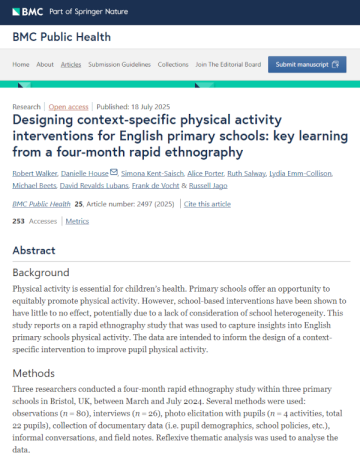Primary schools can play to their strengths in boosting child physical activity
- 28 July 2025
A 4 month rapid ethnography study in 3 primary schools across Bristol reveals that “one‐size‐fits‐all” physical activity strategies will fall short. Schools differ widely in culture, resources, and objectives, meaning they need tailored, context‑specific physical activity interventions, according to the study results, published in BMC Public Health.
Led by University of Bristol researchers and colleagues, this qualitative investigation is part of the PASSPORT (Physical activity via a school‑specific portfolio) research programme. PASSPORT is designing an approach to deliver bespoke school interventions.
From March to July 2024, researchers collected 80 observations, 26 interviews, and 4 pupil-led photo-elicitation sessions. They also collected data on school policies and programmes and informal chats across the 3 urban and suburban schools.
Schools have their own marker of success in physical activity
Researchers found schools measured success in physical activity in different ways, such as improving pupil engagement and socio‑emotional outcomes, exposing children to activities unavailable in their local area, and ensuring off-site transport to enhance the curriculum due to driven limited on-site facilities.
Physical activity varies across the day
Across all schools, breaktimes were the most consistently active periods for children. PE classes focused on fundamental skills with limited vigorous movement, often paused by teaching demands or space constraints. After-school clubs provided high-quality physical activity but struggled to include all students equitably.
Multiple stakeholders, multiple priorities
The study emphasised a 3-pronged challenge:
- Senior leadership teams viewed physical activity through a strategic lens -linking it to Ofsted, attendance and attainment – but were constrained by high workloads and tight budgets
- Teachers faced packed timetables across core and foundation subjects. Physical activity often lost out to English, maths and science demands
- Pupils simply wanted fun, engaging activities. They liked forest school, sports days, running clubs and variety in sport
Infrastructure matters
Some physical activities are simply unfeasible in space‑restricted or resource‑limited schools. Urban schools lacked space for clubs or outdoor learning. Staffing shortages – especially fewer classroom assistants – made active lessons harder to manage.
But so do funding gaps
Notably, parent teacher association (PTA) funding disparities created significant inequalities. One school’s PTA raised thousands for playground upgrades and activities, while another with fewer resources could cover costs for a small amount of PE equipment.
Five evidence-based recommendations
Drawing on themes from the research, authors offer practical guidance for developing school‑specific physical activity interventions:
- Explore school culture first
Build interventions around how each school already values physical activity, be it wellbeing, achievement or extracurricular experience - Map stakeholder priorities
Understand senior leadership teams, teachers and pupils to create shared buy‑in - Align to capacity and facilities
Tailor strategies to actual school size, staffing and daily schedules - Adopt a portfolio model
Combine PE, active breaks, clubs, forest school to cover multiple activity opportunities - Address equity gaps
Recognise and support financially weaker schools to narrow the PTA divide
Dr Danielle House, Research Fellow at the University of Bristol, said:
“Without paying attention to the specific context of each school setting, physical activity interventions risk failing. Our study highlights that schools know what works for their students but are juggling multiple demands and practical challenges. They need physical activity programmes that are flexible and responsive to the reality of each school.
“Public health policymakers can support this shift by offering structured guidance, light-touch tools and equitable funding mechanisms, building on what is common across schools as well as their unique strengths.”
PASSPORT is supported by the National Institute for Health and Care Research (NIHR) Bristol Biomedical Research Centre (BRC) and the NIHR Applied Research Collaboration (ARC) West.
